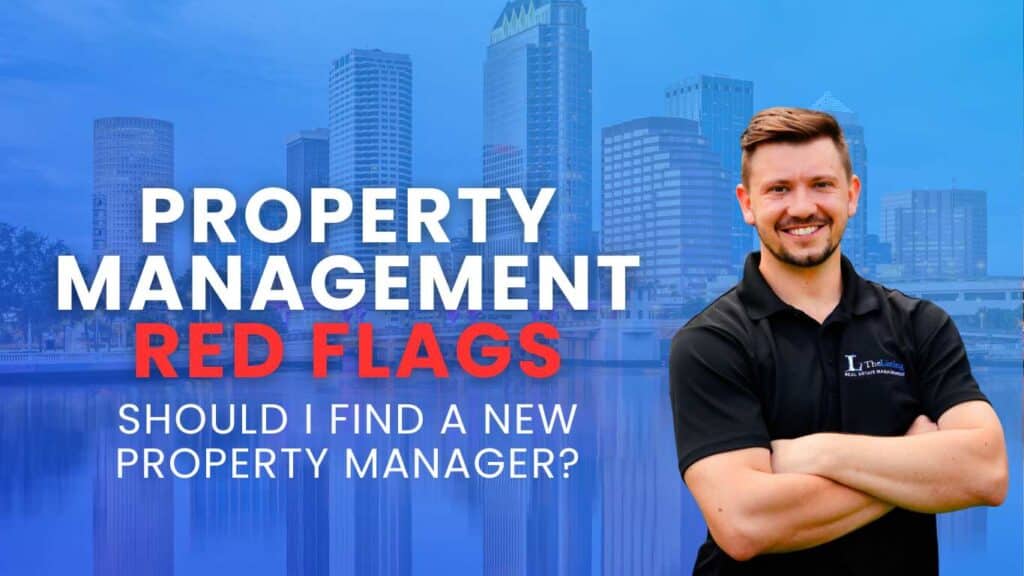Working with a professional property manager can be the best step to take towards rental property success, but it’s essential to look out for property management red flags. Your property management company has the ability to change the trajectory of your rental property success, and it should be for the better.
Unfortunately, not all property managers operate honestly and transparently. Do you find yourself doubting your property manager’s intentions? Here are 3 red flags to look out for that may help you decide to find a new Tampa property manager.
1.) Hidden or Junk Fees and Unclear Financial Reporting
The most essential aspect of owning a successful Tampa rental property is handling finances. Whether it be collecting rent or allocating funds from your property maintenance reserve to pay vendors, professional property managers should have a clear system of financial management and reporting procedures. These processes should be clearly outlined in your property management agreement, and enforced regularly. This agreement will set the standard for what you can expect from your property manager— it is crucial that you understand exactly what you’re paying for and when you can expect to be paid.
While evaluating a property management agreement can be tedious, your success and financial returns rely heavily on your property manager; it is crucial to know exactly what you are paying for. Your property management agreement should clearly outline the following:
- Fee structure (whether it’s a percentage based or flat fee structure)
- Property management fee
- Tenant placement fee
- Lease renewal fee
- Property maintenance and maintenance reserve account payment processes
- Rent collection and payment process
In addition, your Tampa property manager should be providing property owners with clear and regular financial statements. These financial statements provide insight into your property’s income and expenses and ensure financial transparency. Some financial red flags to look out for are:
Hidden or Junk fees:
Hidden fees are fees that may not be explicitly outlined in your property management agreement. Some property managers will charge for normal management services that should be covered under the property management fee such as vague administrative tasks or inspections.
While each property management company’s covered fees vary, all fees should be specified in the property management agreement. If your property manager is constantly tacking on unexpected and undiscussed fees, it may be time to reevaluate and change property managers. Unless there is an unusual or immediate emergency, property owners should be aware of every fee, including one-time fees, regular fees, and maintenance costs.
Vague or Lack of Reports
Your property manager should be providing updated monthly reports detailing the income, expenses, and status of your rental property. Were there any maintenance issues? Did the vendors get paid out using the funds from your property maintenance reserve account? Did your tenant pay rent on time and in full? The answers to these questions should be explained in detail by your property manager.
If your property manager fails to provide an explanation for a lack of income or increased expenses, you should ask for an extensive breakdown of all financial transactions. A lack of financial reporting can leave you in the dark; your rental property is a valuable asset that must be managed attentively. The last thing you want to do is let your property management company take advantage of your lack of knowledge. Stay informed and always ask questions if you feel your property manager is not being honest with you.
Lack of Transparency
A major red flag to look for is a lack of transparency from your property manager. Professional property management should provide peace of mind, allowing rental property owners to take a back seat on the hectic nature of daily management, all while earning a significant monthly income. However, hiring a property manager does not mean you should be completely withdrawn from all management processes and upkeep of your property. While your property manager will have decision-making power and control of your property’s operation, they should be communicating with and updating you fairly often.

The manager you entrust with your valuable Tampa rental property should be reliable, transparent, and professional. Professional property managers know how important your rental property is; for example, at The Listing, we treat each property as if it were our own. This means that we are in constant communication with our property owners, providing 100% transparency to maintain a high level of success and trust.
Unfortunately, not all property managers not operate honestly with 100% transparency. Here are some key red flags to look out for:
Poor Communication:
Your property manager should not be dodging your calls, leaving your texts on read, or replying to your emails solely with an automated response. Failed communication can be a sign of withholding information or neglecting your property and tenants. Whether it be a pressing issue or a general question, your property manager should prioritize prompt communication and efficient problem solving.
Tenant Neglect:
Keeping an open line of communication with tenants is an essential responsibility of a property manager. Rental payments are your source of income; tenant neglect can hinder tenant satisfaction and retention, resulting in rental income loss. In addition, failed communication between your property manager and tenants can also lead to unresolved maintenance issues and damage to your property. Addressing tenants needs is one the most essential aspects of property management, neglecting to do so is a big red flag.
Failure to Perform Duties:
Hiring a property manager means paying for management services specified in your property management agreement. Services vary depending on the company, but typically include marketing, tenant placement, rent collection, and maintenance and repairs. Failing to perform these services but continuing to charge for them shows a lack of professionalism, and efficiency. Paying for services that are not performed not only depletes your finances, but hinders the performance of your rental property and serves as a sign that your property manager may be swindling you.
Paying for a property manager that doesn’t manage your property is like paying for a pet sitter that never shows up. Just as a no-show pet sitter would leave your pet unsupervised and potentially lead to damage, a property manager who fails to perform management services can leave your rental property in disarray. In both cases, you would likely cancel, seek a refund, and search for a reliable replacement.
Outrageous Maintenance Fees:
Property management agreements typically include a maintenance threshold, or the manager’s authority to authorize maintenance repairs at or below the threshold without owners’ authorization. This means that the property owner and property manager agree on a specific monetary amount in which permission is not needed to go forward with maintenance. For example, if your maintenance threshold is $1,000, your property manager must obtain approval before going forward with a repair exceeding the cost of $1,000. However, if the situation is a damage-causing emergency like a flood or fire, the property manager will typically proceed immediately to prevent further damage.

If your maintenance bill is racked up with outrageous fees, your property manager probably cannot be trusted to handle your finances. Examples of unnecessary maintenance fees are:
- Marked-up repair fees: An additional fee your property manager charges for repairs.
- Routine maintenance service fees: Significant fees for simple routine maintenance such as changing a lightbulb or wiping down countertops.
- Charges for unperformed work: Charges for work that was unfinished or unperformed. Your property manager should be vetting all contractors to ensure reliability and efficiency.
- Altering your property without permission: Although some emergency maintenance repairs are necessary, your property manager should not be altering your property or making significant maintenance decisions without your permission. This can include major renovations, exterior appearance changes, or changing security features.
If it happens once, there is no saying it will not happen again. Big decisions regarding large maintenance projects should not be made on your behalf unless it is an emergency— this can significantly impact the status of your property and your finances.
Should I Find a New Property Manager?
All property management companies operate differently, so it’s essential to try to get to know them before you hire them. While you may only speak to the property manager a few times before hiring them, there is a lot more research to conduct. Going through a property manager’s website and social media can typically give you a solid understanding of their knowledge and skill level.
Do they have a blog showcasing their resourcefulness and industry knowledge? Do they explain their services and prices or do they fail to state what a client pays for? Does the information they conveyed over the phone match the information on their website? Do they have positive Google reviews from clients and maintenance vendors? It is important to know your property manager is dedicated to their craft and will be a continuous resource for you and your rental property.
If you find that your property manager tacks on hidden fees, withholds information about your finances, lacks transparency, and charges outrageous and unusual maintenance fees, it is time to find a new property management company. A dishonest and untrustworthy property manager will have the opposite effect that you hoped to seek when hiring a property manager.
A professional and experienced property manager is the cornerstone of successful rental property ownership. The knowledge and expertise of a trustworthy property manager will provide peace of mind and help make positive decisions leading to low vacancy rates, years of success, and wealth.
At The Listing Real Estate Management, our honest and reliable property managers play a pivotal role in our client’s success. Trust and transparency go a long way in property management, and we believe our authenticity, attention to detail, and always doing what is right produce our boutique property management experience in the Central Florida area. If you’re looking for a reliable property manager to lead you to years of rental property success, significant wealth, and overall peace of mind, contact us today at The Listing Real Estate Management. We are here for you from beginning to end.
Copyright © 2017-2024, The Listing Real Estate Management. All Rights Reserved.






